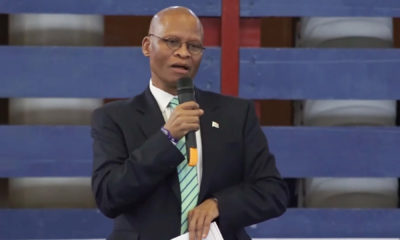
Banner

Mogoeng Mogoeng vindicated in Masuku judgment
The highest court in the land last week ruled that recently retired Chief Justice Mogoeng Mogoeng’s so-called controversial Israel comments made during a webinar in 2020 were “nothing more than his religious and personal views”.
Earlier this month, Mogoeng “was forced by the law” to apologise for comments he made about Israel in a June 2020 Jerusalem Post webinar with Chief Rabbi Dr Warren Goldstein. He said South Africa had a role to play in resolving the Israeli-Palestinian conflict, that he supported both peoples, and as a Christian, he had an obligation to pray for the peace of Jerusalem.
His comments led to three anti-Israel organisations taking him to task, complaining that Mogoeng committed wilful or grossly negligent breaches of the code of judicial conduct in that he had become involved in political controversy or activity. The other complaint was that he had involved himself in extrajudicial activities.
The Judicial Conduct Committee, which heard the complaint, in April 2021 found him guilty and ordered him to apologise unconditionally.
The appeals committee in January 2022 found that Mogoeng had “involved himself in political controversy” and “was involved in extrajudicial activities”. He was ordered to apologise, which he did on Thursday, 3 February, even though he admitted that he did so reluctantly.
The former chief justice was vindicated in the long awaited Concourt judgment that found Bongani Masuku, former international relations secretary of the Congress of South African Trade Unions (Cosatu), guilty of hate speech.
The judgment that ordered Masuku to apologise to the Jewish community for comments made 13 years ago also made the Concourt’s views on Mogoeng clear. These views formed part of the judgment in an application for Mogoeng to stand down from the Masuku case, brought by him and Cosatu in November last year. They submitted that Mogoeng, through his Israel comments, had created a reasonable apprehension of bias against them.
“Interpreted objectively and within the context of the entire webinar, none of Mogoeng CJ’s statements can be taken to be anything more than his religious and personal views,” read the judgment. “Quite contrary to what the respondents argue, an objective reader wouldn’t understand the comments to be advocating for a particular political stance towards the conflict other than, at most, hopes of forgiveness, peace and love. They do not intimate any kind of hostility or negative views towards any of the parties involved in the conflict.
“It’s an untenable stretch to characterise Mogoeng CJ’s comments as expressing ‘unconditional support for the state of Israel’ when the context quite evidently shows that Mogoeng CJ was communicating his biblical love for all, including Israel and Palestine, and his opinion on South Africa’s painful past and unique perspective which enables it to advocate for peace in the global context. There’s also nothing in the evidence provided by the respondents which supports the notion that Mogoeng CJ condemned the BDS [Boycott, Divestment, Sanctions] movement and South Africa’s stance towards Israel. On the contrary, the transcript of the webinar reveals that Mogoeng CJ declined to comment on whether the BDS movement was conducive to a peaceful resolution of the conflict.”
The crux of Masuku and Cosatu’s case for recusal was that Mogoeng’s Israel comments and subsequent conduct showed that he held strong personal views which were diametrically opposed to their beliefs.
Based on his comments, they claimed that Mogoeng “professed his unconditional support for the state of Israel, and that he has openly condemned the BDS movement and South Africa’s political stance towards the Israel-Palestine conflict”. On the basis of these publicised views, Masuku and Cosatu submitted that it was evident that Mogoeng wouldn’t be able to bring an impartial mind to adjudication of the main application.
However, the Concourt said in its ruling that on a plain reading of the transcript of the webinar, Masuku and Cosatu’s submissions were “unsustainable”. It ruled that they didn’t meet the legal test for reasonable apprehension of bias.
Rowan Polovin, the national chairperson of the South African Zionist Federation (SAZF), welcomed the comments made in the Constitutional Court matter against Masuku regarding Mogoeng’s statements about Israel. “The SAZF, from the very beginning, has maintained that the chief justice’s utterances were uncontroversial.
“These comments from the Constitutional Court vindicate the SAZF position that the chief justice’s comments weren’t politically controversial nor amounted to the chief justice involving himself in a political controversy. The SAZF, therefore, questions why so much airtime was given to this issue when there are so many pressing issues affecting the judiciary.”
Advocate Mark Oppenheimer, who represented the Rule of Law Project (ROLP) as amicus curiae (a friend of the court) in the matter said, “After 13 years of the South African Jewish Board of Deputies battling very clear antisemitism, it’s a resounding victory that the Constitutional Court has held Bongani Masuku liable for hate speech. He tried to derail this process by issuing a recusal application against the chief justice for statements he made in relation to Israel and Palestine in 2020. The court saw this tactic for what it was, and unanimously held that there was no reason for the chief justice to recuse himself as there was no reasonable apprehension of bias. We vehemently opposed his application for recusal, and we are delighted with the results that were handed down.”
Oppenheimer said the case also gave further clarity to what “the rules are for genuine hate speech and what speech will be protected by the Constitution”.
In opposing papers before the Constitutional Court, the ROLP said the Mogoeng interview and various other comments relating to his religion didn’t impair his judicial impartiality.
“It’s evident that Mr Masuku and Cosatu hold strong prejudices against Israel. The fact that Mogoeng CJ doesn’t share those prejudices isn’t a reason for him to recuse himself. His comments were decried not because of a denouncement of Palestine, but rather a failure to condemn Israel. The mere fact that Mogoeng CJ doesn’t condemn Israel doesn’t logically lead to the conclusion Mr Masuku and Cosatu won’t enjoy a fair hearing,” stated the ROLP.
The Concourt ruling added that the law didn’t expect judges to “deactivate their humanity and operate from islands of indifference”, and that the test for recusal wouldn’t be satisfied on the basis that a judge may have views or beliefs that differ from those of the parties before them, “even if those beliefs are relevant in some way to the matter.
“It’s safe and pragmatic to assume that judges are able to set aside their personal views and be guided by the relevant legal principles when deciding any matter. We must, after all, be reminded of the weight of the presumption of impartiality,” it ruled.
“Whatever disagreement or disapproval the respondents may harbour in relation to the personal and religious views that Mogoeng CJ espoused are simply insufficient to constitute a valid ground for recusal,” wrote the Concourt.











Leslie Martin Kobrin
February 26, 2022 at 9:54 am
What will be interesting to observe and note is whether Masuku and Cosatu tender the apology in terms of the Order of the Constitutional Court and whether the wording of their apology, if given, will demonstrate appropriate sincerity and remorse.